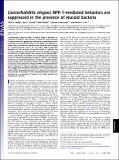Caenorhabditis elegans NPR-1–mediated behaviors are suppressed in the presence of mucoid bacteria
Author(s)
Reddy, Kirthi C.; Hunter, Ryan C.; Bhatla, Nikhil; Newman, Dianne K.; Kim, Dennis H.
DownloadReddy-2011-Aug-Caenorhabditis elega.pdf (827.1Kb)
PUBLISHER_POLICY
Publisher Policy
Article is made available in accordance with the publisher's policy and may be subject to US copyright law. Please refer to the publisher's site for terms of use.
Terms of use
Metadata
Show full item recordAbstract
Caenorhabditis elegans exhibits a diverse range of behaviors in response to bacteria. The presence of bacterial food influences C. elegans aerotaxis, aggregation, locomotion, and pathogen avoidance behaviors through the activity of the NPR-1 neuropeptide receptor. Here, we show that mucoid strains of bacteria that produce an exopolysaccharide matrix do not induce NPR-1–dependent behaviors. In the presence of mucoid strains of bacteria, the C. elegans laboratory wild-type (WT) strain N2 exhibits behaviors characteristic of wild isolates and mutants with reduced NPR-1 activity. Specifically, N2 exhibits lawn bordering and roaming behavior on mucoid nonpathogenic bacteria and loss of pathogen avoidance on mucoid Pseudomonas aeruginosa. Alginate biosynthesis by laboratory and clinical isolates of mucoid P. aeruginosa is necessary and sufficient to attenuate NPR-1–mediated behavior and it suppresses C. elegans pathogen avoidance behavior. Our data suggest that the specific interaction with nonmucoid bacteria induces NPR-1–dependent behaviors of C. elegans. These observations provide an example of how exopolysaccharide matrix biosynthesis by a community of bacteria may inhibit specific host responses to microbes.
Date issued
2011-08Department
Massachusetts Institute of Technology. Department of Biology; Massachusetts Institute of Technology. Department of Brain and Cognitive SciencesJournal
Proceedings of the National Academy of Sciences of the United States of America
Publisher
National Academy of Sciences (U.S.)
Citation
Reddy, K. C. et al. “Caenorhabditis Elegans NPR-1-mediated Behaviors Are Suppressed in the Presence of Mucoid Bacteria.” Proceedings of the National Academy of Sciences 108.31 (2011): 12887–12892. Web. © 2011 by the National Academy of Sciences.
Version: Final published version
ISSN
0027-8424
1091-6490